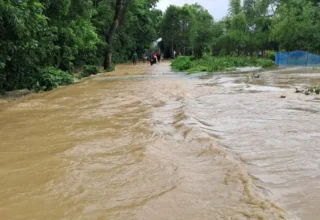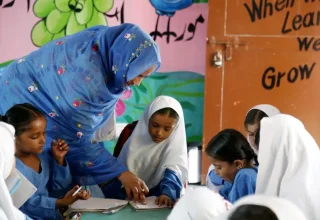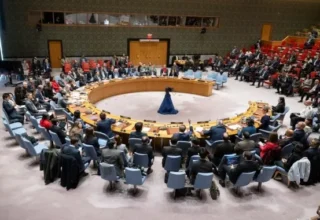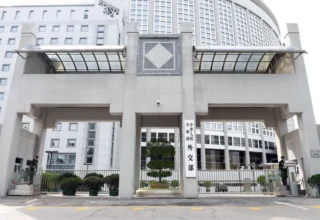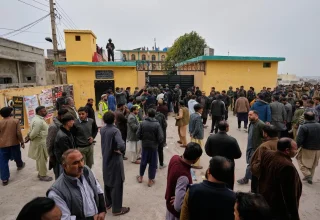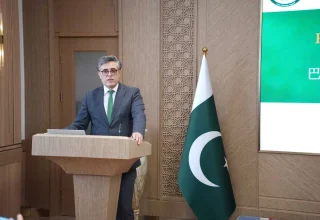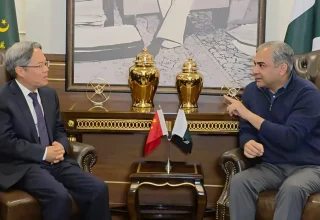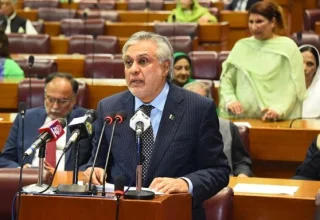
ISLAMABAD: Minister for Finance and Revenue Ishaq Dar Friday presented a Rs14.46 trillion budget for the next fiscal year, avoiding rolling out new taxes and targeting economic growth of 3.5% as the cash-strapped nation seeks to unlock the International Monetary Fund’s (IMF) bailout money.
Pakistan has shared the budget numbers with the IMF, and the finance minister believes there’s no further objection the lender could raise as they are in line with the programme requirements.
Dar who presented the second budget of the Pakistan Democratic Movement-led government, which came into power in April last year, in the National Assembly and Senate returned to the podium to announce the federal budget after a hiatus of five years.
At the outset of his budget speech which began after a delay of almost two hours the finance minister presented a comparative report of former prime minister Nawaz Sharif-led government (2013-2017) and the “incompetent” government led by Pakistan Tehreek-e-Insaf (2018-2022).
Highlighting the importance of the budget deficit, Dar said that it plays a major role in the economic issues of the country. “The PTI government miserably failed to bring reforms to the taxation system and increased the expenses substantially which is why the budget deficit during the almost four-year was almost double compared to the Pakistan Muslim League-Nawaz’s (PML-N) five-year tenure,” he lamented.
Under the leadership of Nawaz, Pakistan’s economy witnessed 6.3% GDP growth and was on the path to becoming a G20 member during the last tenure of PML-N, loadshedding was eliminated from the country, and inflation was kept under control.
The finance minister mentioned that the country faced numerous internal and external challenges over the last year, but the government upped its efforts and tried to provide relief to the people.
Dar mentioned that although the nation suffered massive losses of $30 billion due to unprecedented floods, the government is bidding to resume the IMF programme and take the country on the road of development.
“We have completed all the prerequisites of the ninth IMF review […] we are hoping to reach an agreement with the IMF,” the minister told the members of the lower house.
“Pakistani economy’s second major problem is the current account deficit,” he said, adding that it had swelled to $17.5 billion during the fiscal year 2021-22.
The finance minister mentioned that due to the “prudent decisions of the incumbent government” majorly the import curbs the CAD has been reduced by 77% to $4 billion.
Likewise, he said, the trade deficit has been reduced by $21 billion.
“The threat of default has been averted due to the tough decision of the government and the fall in foreign exchange reserves has been slowed down,” the finance minister said.
The finance minister said the government had proposed an allocation of Rs1,150 billion (including Rs200 from Public Private Partnership mode), and for the provincial programme, Rs1,559 have been proposed.
The finance minister said remittances are a crucial part of foreign exchange reserves, representing 90% of the country’s exports. In a bid to promote remittances through formal channels, the government has proposed the following steps:
Abolishment of 2% final tax on the purchase of immovable property.
Introduction of a “diamond card” for people sending over $50,000 through which they can get one non-prohibited bore license, gratis passport, preferential access to Pakistani embassies and consulates, fast-track immigration at Pakistani airports, special prizes through draws.
Highlighting the importance of education, the finance minister said that although it falls under provincial jurisdiction, the federal government always plays its part.
For the Higher Education Commission (HEC), the federal government has proposed an allocation of Rs65 billion under the current expenditure, while Rs70 billion have been allocated for the development expenditure.
It was also revealed that Pakistan Endowment Fund will be established for the financial aid of the sector for which Rs5 billion have been allocated in the budget.
Meanwhile, under the Prime Minister Laptop Scheme, the federal government has decided to distribute 100,000 laptops to merit-based deserving students and for this, the cabinet has proposed to allocate Rs10 billion.
Dar mentioned that the construction sector is vital to economic output.
“And in order to incentivise the construction sector, Dar said the 10% or Rs5 million, whatever amount is less, will be charged on construction enterprise income.”
Those individuals who will construct their own property will be given a 10% tax credit or Rs5 million for the next three years as part of the concessions to the construction sector.
Real Estate Investment Trust (REIT)-related tax exemptions have been extended till June 30, 2024. Dar said Pakistan depends on imported fuel to meet energy requirements, and the government is determined to promote solar energy and the use of local coal.
Several measures have been proposed to meet the energy needs: Coal-powered power plants have been instructed to use local coal. Raw materials of solar panels, inverters, and batteries are being exempted from custom duties.
To resolve of issue of fuel shortage due to disruption in the global fuel supply chain, “Bonder Bulk Storage Policy” is being introduced under which foreign suppliers using their own resources, will import the fuel to store it in the fuel storage.
Refinery and oil marketing companies will be allowed to buy oil from the storage facility.
The finance minister said Rs7,200 billion are likely to be collected in tax revenue and the provinces’ share would be Rs4,129 billion during the next fiscal year.
He said FBR is expecting to collect Rs1,618 billion from non-tax revenue, and federal tax collection will be Rs4,689, while total expenditure is estimated at Rs11,090 billion.
Finance Minister Dar said no new tax is being imposed this year, and all efforts are being made to provide relief to the masses.
He said the government is trying to increase employment opportunities and introduce policies to promote the ease of doing business.
Dar said industries and exports should be encouraged to play their part in increasing the country’s foreign exchange reserves. Dar said imposing taxes on the rich is the leading principle of the government’s taxation policy, and the tax was imposed on high-earning individuals.
Besides, he added that the 10% super tax was imposed on 15 businesses and sectors earning up to Rs150 million in the last budget.
He said measures had been proposed to convert the super tax into progressive taxation by increasing its tax percentage. Dar-led Ministry of Finance has proposed the imposition of a 10% withholding tax on the bonus shares (in-kind dividend) as the finance minister said that some companies, in order to skip taxes, issue bonus shares instead of cash dividends.
The finance minister said not only was there a need to increase the foreign exchange reserves of the country, but loopholes dwindling the reserves required to be eliminated as well.
In this regard, he said withholding tax has been increased from 1% to 5% for tax filers, while non-filers will pay a 10% withholding tax on international transactions to discourage the outflow of foreign currency through debit and credit cards and other banking channels.
In his speech, Dar said the government is aware of the difficulties faced by government employees, and keeping this in mind, several steps are being taken for their relief.
He said it had been proposed to increase the minimum wage to Rs32,000 for Islamabad Capital Territories (ICT). Dar said that the minimum pension is being increased to Rs12,000. He also proposed to increase the Employees’ Old-Age Benefits Institution (EOBI) pension to Rs10,000.
It has also been proposed that the government will pay the debts of widows up to Rs1 million through House Building Finance Corporation (HBFC) while the deposit limit in national savings accounts for martyrs is being increased from Rs5 million to Rs7.5 million.
The finance minister said that the Behbood Savings Certificate deposit has been proposed to increase to Rs7.5 million from Rs5 million.



















